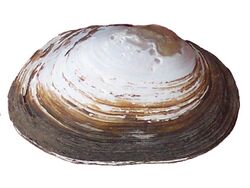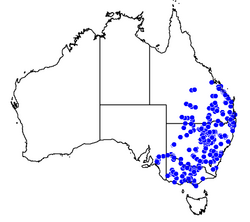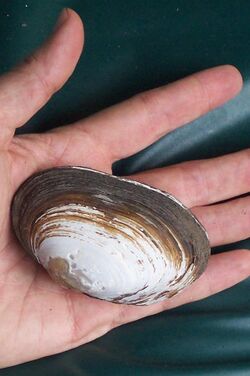Biology:Velesunio ambiguus
| Velesunio ambiguus | |
|---|---|

| |
| View of the right valve of Velesunio ambiguus, from Ashley via Moree, Australia. | |
| Scientific classification | |
| Domain: | Eukaryota |
| Kingdom: | Animalia |
| Phylum: | Mollusca |
| Class: | Bivalvia |
| Order: | Unionida |
| Family: | Hyriidae |
| Genus: | Velesunio |
| Species: | V. ambiguus
|
| Binomial name | |
| Velesunio ambiguus (Philippi, 1847)
| |
| Synonyms[1][2] | |
|
Unio ambiguus Philippi, 1847 | |
Velesunio ambiguus, the flood plain mussel,[3] or the billabong mussel (South Australia),[4] is a species of freshwater bivalve in the family Hyriidae.
There are four other cryptic species in the genus Velesunio (which all look similar to Velesunio ambiguus) in Australia.[5]
Distribution
Australia: Queensland, New South Wales, Victoria,[3] and South Australia, where it is known as the billabong mussel.[4]
Biotope
Static waters.[3]
Life cycle
The lifespan of this clam is over 20 years.[3]
It can survive temperatures from around 4 °C to over 30 °C.[3]
Human uses
Velesunio ambiguus serves as a food for Australian Aborigines, although its flesh is tough.[3]
This species can also be used in fish ponds to filter microscopic algae out of the water.[3]
References
- ↑ OZ: Freshwater Mussels of Australasia (beta)[|permanent dead link|dead link}}]. The MUSSEL Project Web Site: MUSSELpws, last updated 2 January 2008, Retrieved 10 March 2009
- ↑ "MUSSELpdb | nominal sp. Velesunio ambiguous Graf & Cummings, 2006". https://mussel-project.uwsp.edu/fmuotwaolcb/nomsp_6454.html.
- ↑ 3.0 3.1 3.2 3.3 3.4 3.5 3.6 2007. Freshwater Mussels - Velesunio ambiguous. Environmental Remediation of Wetlands and Dams[|permanent dead link|dead link}}]. Aquablue Seafoods. online, Retrieved 13 March 2009.
- ↑ 4.0 4.1 Wade, Sam; Corbin, Tracey; McDowell, Linda-Marie (June 2004). Critter Catalogue: A guide to the aquatic invertebrates of South Australian inland waters.. Original illustrations by John Bradbury.. Environment Protection Authority (South Australia). p. 28. ISBN 1-876562-67-6. https://www.epa.sa.gov.au/files/8543_critters.pdf.
- ↑ Fawcett J.H., Hughes J.M. & Baker A.M. 2006. Conservation of the Australian freshwater mussel[|permanent dead link|dead link}}]. Applications of Genetics in Freshwater Ecology, NABS Annual meeting, Anchorage, Alaska.
Wikidata ☰ Q7918897 entry



